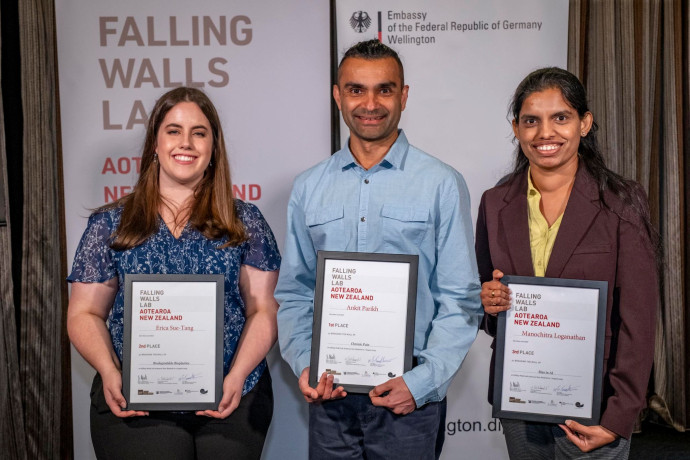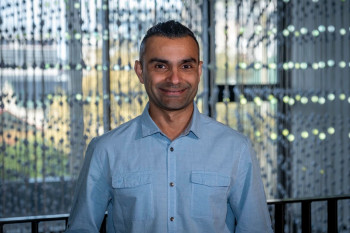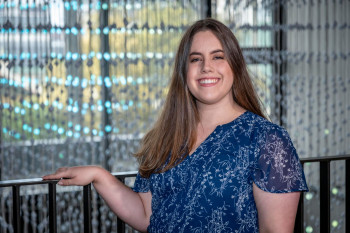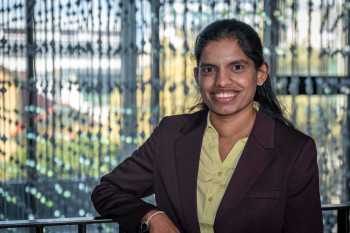News
Published 12 August 2025Chronic pain, biodegradable bioplastics, and bias in AI were winning topics at Falling Walls Lab Aotearoa New Zealand

A drug-free, at-home treatment for chronic pain, creating truly biodegradable bioplastic from waste plant fibre, and an automated tool that can overcome bias in AI decision-making were the winning topics at the 2025 Falling Walls Lab Aotearoa New Zealand pitch competition, held at the Royal Society Te Apārangi on 7 August 2025.
Ankit Parikh, Auckland University of Technology / Exsurgo Ltd, placed first for a drug-free, at-home treatment for chronic pain that is showing promising early results to reduce pain through vagus nerve stimulation.
 Ankit explained that chronic pain affects 1 in 5 people living in the Western world (in New Zealand the rate is reported as 19%). Chronic pain affects health, mood and quality of life. Chronic pain can be from long-term back or neck pain, migraine, arthritis, fibromyalgia and many more conditions. It costs billions in healthcare and productivity and medication is only about 30% effective. Factors that contribute to chronic pain include overactive pain processing in the brain, dysregulation of the immune system, and an overactive stress response. Research has shown that there can be improvements in these factors by stimulating the vagus nerves through its branch in the ear, most effectively during an exhalation. So far, this research has been limited to laboratories, due to a lack of portable equipment. Ankit's innovation has been to build a portable kit that can be used at home. Patients wear a custom electrode in their ear that stimulates their vagus nerve when a respiration sensor detects they are exhaling. Early results from a pilot study in 12 patients with rheumatoid arthritis to assess safety and acceptability showed promising results and patients self-reported reductions in pain and improvement in mood using the device for 20 minutes a day for two weeks. The kit is now ready for randomised clinical trials to confirm treatment effectiveness. If successful, it would offer a drug-free, non-invasive option for pain management. Other early research on this type of treatment suggests it may also be beneficial in treating hypertension and depression.
Ankit explained that chronic pain affects 1 in 5 people living in the Western world (in New Zealand the rate is reported as 19%). Chronic pain affects health, mood and quality of life. Chronic pain can be from long-term back or neck pain, migraine, arthritis, fibromyalgia and many more conditions. It costs billions in healthcare and productivity and medication is only about 30% effective. Factors that contribute to chronic pain include overactive pain processing in the brain, dysregulation of the immune system, and an overactive stress response. Research has shown that there can be improvements in these factors by stimulating the vagus nerves through its branch in the ear, most effectively during an exhalation. So far, this research has been limited to laboratories, due to a lack of portable equipment. Ankit's innovation has been to build a portable kit that can be used at home. Patients wear a custom electrode in their ear that stimulates their vagus nerve when a respiration sensor detects they are exhaling. Early results from a pilot study in 12 patients with rheumatoid arthritis to assess safety and acceptability showed promising results and patients self-reported reductions in pain and improvement in mood using the device for 20 minutes a day for two weeks. The kit is now ready for randomised clinical trials to confirm treatment effectiveness. If successful, it would offer a drug-free, non-invasive option for pain management. Other early research on this type of treatment suggests it may also be beneficial in treating hypertension and depression.
Erica Sue-Tang, Lincoln Agritech Ltd, placed second for her innovation of creating biodegradable bioplastic from plant waste.
 In her pitch, Erica told the audience members that we each consume microplastic particles equivalent to the plastic in a credit card every week! She explained that existing bioplastics are made from renewable resources but few are biodegradable. For example, PLA is a common bioplastic, but it contributes to microplastic pollution when it breaks down. Erica has developed a method to create a bioplastic from waste plant material, derived from cellulose, the main fibre in plants. She is using a closed-loop system where all chemicals used are recoverable and reusable or able to be put down the drain once neutralised. The resulting product is a clear plastic film and it breaks down into sugars in a home composting system, just as wood does. The cellulose-derived plastic can be heat set or used in a 3D printer.
In her pitch, Erica told the audience members that we each consume microplastic particles equivalent to the plastic in a credit card every week! She explained that existing bioplastics are made from renewable resources but few are biodegradable. For example, PLA is a common bioplastic, but it contributes to microplastic pollution when it breaks down. Erica has developed a method to create a bioplastic from waste plant material, derived from cellulose, the main fibre in plants. She is using a closed-loop system where all chemicals used are recoverable and reusable or able to be put down the drain once neutralised. The resulting product is a clear plastic film and it breaks down into sugars in a home composting system, just as wood does. The cellulose-derived plastic can be heat set or used in a 3D printer.
Manochitra Loganathan, Unitec Institute of Technology, placed third for her automated tool that can check for bias in AI decision-making processes and make suggestions for less-biased selections.
 Manochitra told the audience that today we trust AI-tools to make important decisions such as who gets a loan, who gets a job or who gets life-saving care, but behind this promise of efficiency lies the threat of bias. Already, Māori receive 17% fewer healthcare referrals; ethnic names and resumes receive close to 40% fewer callbacks; and Pasifika people are more than twice as likely on average to be denied a loan, she said. "AI can scale the biases of our past into the systems of our future. AI learns from the biases in our past, repeating and amplifying. Unfair data in equals unfair decisions out for millions." But Manochitra said we are at a turning point: "Either we let AI reinforce our past inequalities or reimagine it for a fairer tomorrow." The innovative tool she is working on, AI4Fairness, can plug into any AI system and check for a biased selection based on ethnicity, gender and background in real time. It also suggests a less-biased selection. With the assistance of Statistics New Zealand, Māori advisers, and advisers from the United States, the tool has been tested on Census data from both countries with strong results. She says that AI4Fairness delivers the fair chance that all members of the community deserve.
Manochitra told the audience that today we trust AI-tools to make important decisions such as who gets a loan, who gets a job or who gets life-saving care, but behind this promise of efficiency lies the threat of bias. Already, Māori receive 17% fewer healthcare referrals; ethnic names and resumes receive close to 40% fewer callbacks; and Pasifika people are more than twice as likely on average to be denied a loan, she said. "AI can scale the biases of our past into the systems of our future. AI learns from the biases in our past, repeating and amplifying. Unfair data in equals unfair decisions out for millions." But Manochitra said we are at a turning point: "Either we let AI reinforce our past inequalities or reimagine it for a fairer tomorrow." The innovative tool she is working on, AI4Fairness, can plug into any AI system and check for a biased selection based on ethnicity, gender and background in real time. It also suggests a less-biased selection. With the assistance of Statistics New Zealand, Māori advisers, and advisers from the United States, the tool has been tested on Census data from both countries with strong results. She says that AI4Fairness delivers the fair chance that all members of the community deserve.
The jury also awarded two honourable mentions.
Patrick Mazzocco, University of Otago, received an honourable mention for a pitch on breaking the wall of career centrality, arguing that career breaks, while often seen as undesirable career interruptions, can help a person build a more well-rounded sense of identity.
Catherine Mahima Singh, The University of the South Pacific, Fiji, also received an honourable mention for a pitch on breaking the wall of legal inaccessibility though an AI-powered legal aid system for marginalised communities.
These three winners and two honourable mention recipients were selected from twenty-one participants from around Aotearoa New Zealand and the Pacific Island Nations who pitched their innovative breakthrough ideas at the Falling Walls Lab Aotearoa New Zealand event held by the Royal Society Te Apārangi last week, with support from the German Embassy in Wellington, the Ministry of Business, Innovation and Employment (through the Catalyst Fund) and EURAXESS Australia & New Zealand.
The participants each had the opportunity to showcase their innovative research, scientific idea, or evidence-based initiative, and explain how it could make a difference for society in a three-minute presentation.
As the winner of 2025 Falling Walls Lab Aotearoa New Zealand, Ankit has won the chance to represent the region and compete at the Falling Walls Lab Global Finale in Berlin in November.
As part of his prize, EURAXESS Australia & New Zealand will offer him mentoring and science communication training, to make sure he will get the most of out his trip to the Falling Walls Lab and Science Summit in Berlin.
See more about the winners and watch their winning pitches:
Breaking the Wall of Chronic Pain
Ankit Parikh, Auckland University of Technology / Exsurgo Ltd
Chronic pain affects around 30% of the global population. It impacts health, mood and quality of life. It costs billions in healthcare and loss of productivity. Current treatments, like surgeries and medications, offer limited relief. Opioids pose major risks. We are developing much-needed non-drug-based alternatives. We have tested our prototype system in a clinical feasibility trial with promising results.
Ankit is a PhD candidate at the Auckland University of Technology and a Research & Development Engineer at Exsurgo Ltd, where he has worked on the development of their innovative and portable electroencephalography (EEG) device-based neurofeedback system to treat chronic pain. He is skilled in software and hardware development and has a passion for developing solutions for medical applications. He has an M.Eng (Bioengineering) from the University of Auckland and a B.Eng (Honours, Electronics and Computer Engineering) from the Manukau Institute of Technology.
Breaking the Wall of Biodegradable Bioplastics
Erica Sue-Tang, Lincoln Agritech Ltd
Common petroleum-based plastics aren’t renewably sourced or biodegradable, and millions of tons end up in the environment, creating cancer-causing microplastics. Bioplastics are made from renewable resources but very few are biodegradable. For example, PLA is a common bioplastic, but it contributes to microplastic pollution. My idea is a cellulose bioplastic made using renewable resources that biodegrades into sugars in natural environments.
Erica has a bachelor’s degree in chemistry from the University of Canterbury. Working in the New Materials team at Lincoln Agritech, her work focuses on the use of cellulose in the creation of fibres and plastics. Erica has experience working with nylon, acrylic, collagen and keratin. Erica is a skilled dancer and choreographer, participating in jazz, musical theatre and contemporary classes and has performed in national events.
Breaking the Wall of Bias in AI
Manochitra Loganathan, Unitec Institute of Technology
We aim to make AI systems fair and inclusive for historically-disadvantaged communities. Currently, many AI models reflect and reinforce historical discrimination, leading to biased outcomes in areas like healthcare, employment and justice. These patterns are often embedded in data and algorithms. We are developing an automated tool to detect and reduce such bias in real-world AI decision-making.
Manochitra Loganathan is a Master’s researcher in Artificial Intelligence at Unitec, Auckland. After witnessing how biased AI harms people, she set out to fix it, especially for Māori and historically-disadvantaged groups across Aotearoa and beyond. Backed by 12 years of experience in data and cloud platforms, she built a practical tool to help reduce bias in real-world AI decision-making. Her work turns research into impact, proving that AI can be made more fair, inclusive and accountable.
A special thank you to the expert jury who had the difficult task of selecting winners:
- Professor Phil Lester, Te Herenga Waka – Victoria University of Wellington (Chair)
- Professor Riz Firestone, Te Kunenga ki Pūrehuroa, Massey University
- Professor Volker Nock, Te Whare Wānanga o Waitaha, University of Canterbury
- Veronika Meduna, New Zealand Editor, The Conversation
- Winnie Switakowski, Deputy Head of Mission at the German Embassy in New Zealand
Full event
You can also view the video below of the full 2025 Falling Walls Lab Aotearoa New Zealand event or see the 2025 Falling Walls Lab Aotearoa pitch playlist on YouTube. View programme.
Photographs
View photographs from the event.
